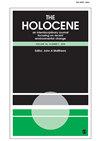在狩猎采集者中反复出现的长期人口增长过度和衰退
IF 1.8
3区 地球科学
Q3 GEOGRAPHY, PHYSICAL
引用次数: 0
摘要
我们提出了一个模型,可以解释人口中长期的人口增长和下降事件:生产的集约化在个人产生过剩能量以在短期内最大限度地提高其健康水平的适应能力和整个人口平稳过渡到人口结构的长期能力之间产生了权衡平衡该模型调和了人类人口变化动态系统模型的相互矛盾的见解,我们通过开发时间序列来估计过去12500年中人类人口密度、模拟生态系统生产力、人类饮食和劳动力的变化,对该模型在得克萨斯州中部的影响进行了初步测试 年。我们的分析表明,得克萨斯州的狩猎采集者经历了三次长期的人口增长超调和准均衡衰退。有证据表明,这些过度和衰退中的每一个都与致力于处理高密度、低质量资源以释放热量和营养的饮食和劳动的变化有关。从长远来看,人口衰退可能是必要的,因为人口需要尝试社会和物质基础设施的变化,以提高其环境的承载能力。本文章由计算机程序翻译,如有差异,请以英文原文为准。
Repeated long-term population growth overshoots and recessions among hunter-gatherers
We propose a model that may explain long-term population growth and decline events among human populations: The intensification of production generates a tradeoff between the adaptive capacity of individuals to generate a surplus of energy to maximize their fitness in the short-run and the long-term capacity of a population as a whole to experience a smooth transition into a demographic equilibrium. The model reconciles the conflicting insights of dynamic systems models of human population change, and we conduct a preliminary test of this model’s implications in Central Texas by developing time-series that estimate changes in human population density, modeled ecosystem productivity, human diet, and labor over the last 12,500 years. Our analysis indicates that Texas hunter-gatherers experienced three long-term population growth overshoots and recessions into quasi equilibria. Evidence indicates that each of these overshoots and recessions associate with changes in diet and labor devoted to processing high density, lower quality resources to unlock calories and nutrients. Over the long-term, population recessions may be necessary for populations to experiment with social and physical infrastructure changes that raise the carrying capacity of their environment.
求助全文
通过发布文献求助,成功后即可免费获取论文全文。
去求助
来源期刊

Holocene
地学-地球科学综合
CiteScore
4.70
自引率
8.30%
发文量
106
审稿时长
4 months
期刊介绍:
The Holocene is a high impact, peer-reviewed journal dedicated to fundamental scientific research at the interface between the long Quaternary record and the natural and human-induced environmental processes operating at the Earth''s surface today. The Holocene emphasizes environmental change over the last ca 11 700 years.
 求助内容:
求助内容: 应助结果提醒方式:
应助结果提醒方式:


